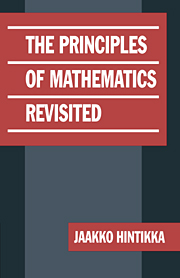Book contents
- Frontmatter
- Contents
- Introduction
- 1 The functions of logic and the problem of truth definition
- 2 The game of logic
- 3 Frege's fallacy foiled: Independence-friendly logic
- 4 The joys of independence: Some uses of IF logic
- 5 The complexities of completeness
- 6 Who's afraid of Alfred Tarski? Truth definitions for IF first-order languages
- 7 The liar belied: Negation in IF logic
- 8 Axiomatic set theory: Fraenkelstein's monster?
- 9 IF logic as a framework for mathematical theorizing
- 10 Constructivism reconstructed
- 11 The epistemology of mathematical objects
- Appendix (by Gabriel Sandu)
- References
- Index of names
- Index of subjects and titles
10 - Constructivism reconstructed
Published online by Cambridge University Press: 15 December 2009
- Frontmatter
- Contents
- Introduction
- 1 The functions of logic and the problem of truth definition
- 2 The game of logic
- 3 Frege's fallacy foiled: Independence-friendly logic
- 4 The joys of independence: Some uses of IF logic
- 5 The complexities of completeness
- 6 Who's afraid of Alfred Tarski? Truth definitions for IF first-order languages
- 7 The liar belied: Negation in IF logic
- 8 Axiomatic set theory: Fraenkelstein's monster?
- 9 IF logic as a framework for mathematical theorizing
- 10 Constructivism reconstructed
- 11 The epistemology of mathematical objects
- Appendix (by Gabriel Sandu)
- References
- Index of names
- Index of subjects and titles
Summary
The approach represented in this book has a strong spiritual kinship with constructivistic ideas. This kinship can be illustrated in a variety of ways. One of the basic ideas of constructivists like Michael Dummett (1978, 1993) is that meaning has to be mediated by teachable, learnable, and practicable human activities. This is precisely the job which semantical games do in game-theoretical semantics. These games can be thought of as being a variety of Wittgensteinian language games. Now these very same Wittgensteinian ideas have been one of the main sources of inspiration to contemporary constructivists. In view of this close relationship of my ideas to those of the constructivists, it is in order to ask what relevance the concepts and results reached here might have to the prospects of a constructivistic theory of the foundations of mathematics.
The answer to this question is not immediately obvious. It might seem that the results reached in the earlier chapters of this book entail a virtual Aufhebung of all constructivistic approaches to the foundations of mathematics. This loaded Hegelian term is appropriate because it almost looks as if I had perhaps vindicated the constructivistic approach to logic and mathematics by refuting it. As was mentioned, the basic ideas of my approach are very much in the spirit of constructivistic ways of thinking. Yet I have ended up apparently rejecting many of the characteristic tenets of constructivism.
Information
- Type
- Chapter
- Information
- The Principles of Mathematics Revisited , pp. 211 - 234Publisher: Cambridge University PressPrint publication year: 1996
